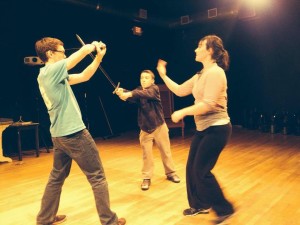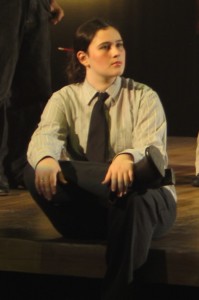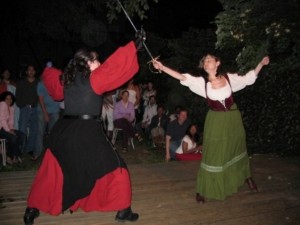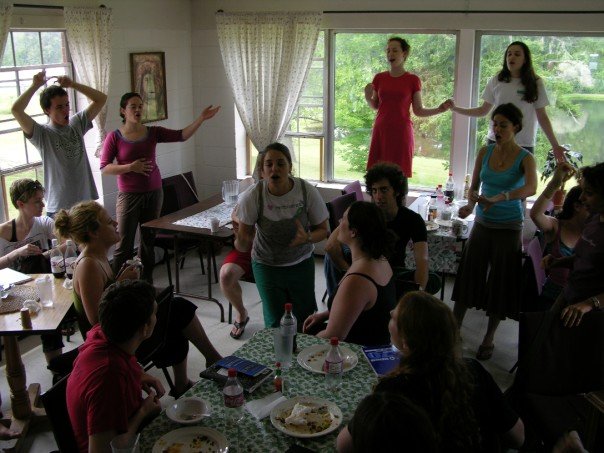At the moment, I’m serving as fight director for Tufts University’s production of RENT. This has caused no small amount of internal time travel.
Music is extremely evocative, and the music from RENT was something that I lived with on a constant basis in my high school years. I listened to that soundtrack so much that I can still sing it top to bottom, backwards and forwards. I may just know RENT better than I know Hamlet (and, as you know, that’s saying something). Last night, I was sitting in on the first minute or two of their run-through (because that’s when my violence occurs… remember? Collins gets the snot beat out of him and his coat stolen in the first number?) which meant that, inevitably, I came home to spend some time with my high school self. And I have a few things to tell her. So, in the event that time travel is a real thing some day, I’m publishing this open letter to my high school self in a place where she’s sure to find it using google.
Dear high school self,
You have to understand first and foremost that nothing I’m about to say is a joke. I know you’re going to find it incredulous that some of these things have happened to you and that this is your life now, but if you can believe in time travel you can believe in this.
You still work in the theatre. You moved to Boston to get a PhD and you’re on your way to becoming a Shakespeare Scholar. You travel around the country to present your work at conferences (just this year, you sat in the Blackfriar’s playhouse in Staunton VA where you heard Russ MacDonald give a keynote… yep… that guy whose book you’re going to read in about three years while sitting on a plane to London where you’re going to study with the Shakespeare Birthplace Trust/Royal Shakespeare company… oh yea, that happens too). You’re also a freelance writer, and (get this) you work as a Fight Director. Yep. In Boston. People pay you to do that (and, by the way, really enjoy your work).
I know you think that New York is the greatest city in the world and you’ll never leave. Well, you still think that and you miss it terribly. But there are things about Boston that you don’t find half bad (being able to have a car, for instance, is pretty rockin’).
Most of your friends are now married with kids. You’re not. It’s the cost of progress.
![This is the earliest readily available picture of myself that I can find. I'm in my New York Apartment living room painting a set for "Complete Works of William Shakespeare [abrgd]".](http://daniprose.com/wp-content/uploads/2014/02/247740_528796680059_5243_n-300x225.jpg)
This is the earliest readily available picture of myself that I can find. I’m in my New York Apartment living room painting a set for “Complete Works of William Shakespeare [abrgd]”.
Let me prepare you for this one too: some pretty tough stuff is going to happen to you. Friends will come and go, people will die, you’ll fall in and out of love, you’re not going to succeed at everything (and some of the things you fail at you’re going to have worked really hard for)… You’re going to understand a broad spectrum of human emotions before you write this letter to you. None of the bad stuff feels good when you’re going through it, but at the end of the day I promise something good comes from each and every awful thing. They help you to understand yourself in ways you didn’t before which, for you, is really important. They make you a better human being. And, if you really don’t care about that (which I’m not convinced you do), they also make you a better actor.
Oh, by the way, you’re pretty good at that acting thing. Don’t let the countless fruitless auditions and meetings with agents/managers get you down. You’re going to get to play some pretty cool roles and work with some pretty great people. But don’t let this go to your head either; the best thing you can do is learn humility as quickly as possible. Even if whomever you’re dealing with doesn’t know more than you do, you’ll get further with the assumption that he does rather than the opposite. And you’ll be surprised the things you can (and will) learn from these situations.
Strive to be curious. Curiosity will take you to great and wonderful places.
Always be tenacious. Bouncing back with fervent persistence is one of your greatest strengths. Whatever it is that you’re pursuing, chase it down and shake it until it’s dead. Unless you don’t actually want to kill it (even in metaphor), in which case chase it down and hug it forever and ever.
I could go on, but I don’t want to spoil anything. The bottom line: it’s all going to work out. You’ll have ups, you’ll have downs, the downs are tough and the ups are great. I can promise you this: you’ll always have some awesome friends around to help you, there will always be a new adventure waiting, and you’ll only ever be as stagnant as you let yourself become.
Much love,
Future you







